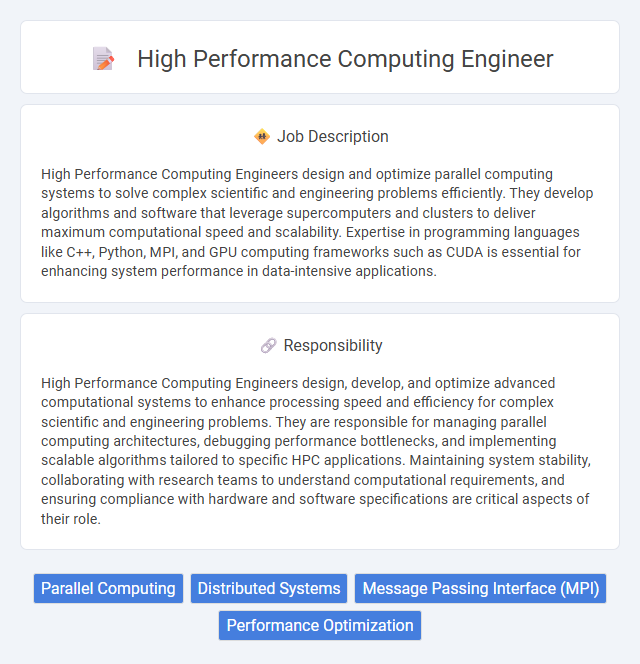
High Performance Computing Engineers design and optimize parallel computing systems to solve complex scientific and engineering problems efficiently. They develop algorithms and software that leverage supercomputers and clusters to deliver maximum computational speed and scalability. Expertise in programming languages like C++, Python, MPI, and GPU computing frameworks such as CUDA is essential for enhancing system performance in data-intensive applications.
Individuals with strong analytical skills and a passion for cutting-edge technology are likely to thrive as High Performance Computing Engineers. Those who enjoy solving complex computational problems and working in collaborative, fast-paced environments may find this role particularly suitable. However, people who prefer routine tasks or minimal technical challenges might not align well with the demands of this position.
Qualification
A High Performance Computing Engineer typically requires a strong background in computer science, with expertise in parallel programming, distributed systems, and algorithm optimization. Proficiency in programming languages such as C++, Python, and experience with HPC frameworks like MPI, OpenMP, or CUDA is essential. Advanced degrees in computer science, engineering, or related fields, combined with practical experience in cluster management and performance tuning, significantly enhance qualification for this role.
Responsibility
High Performance Computing Engineers design, develop, and optimize advanced computational systems to enhance processing speed and efficiency for complex scientific and engineering problems. They are responsible for managing parallel computing architectures, debugging performance bottlenecks, and implementing scalable algorithms tailored to specific HPC applications. Maintaining system stability, collaborating with research teams to understand computational requirements, and ensuring compliance with hardware and software specifications are critical aspects of their role.
Benefit
High Performance Computing Engineers likely enjoy enhanced career prospects due to their expertise in optimizing computational processes for complex simulations and data analysis. There is a strong chance of access to cutting-edge technology and collaboration with leading researchers in fields such as scientific computing, artificial intelligence, and big data. These roles probably offer competitive salaries and opportunities for professional growth within industries that demand scalable and efficient computing solutions.
Challenge
High Performance Computing Engineer roles probably involve tackling complex computational problems that demand optimizing algorithms and hardware configurations for maximum efficiency. The challenge often lies in balancing parallel processing techniques with software scalability while managing resource constraints. Engineers in this field likely face the constant need to innovate solutions that handle massive datasets and intricate simulations in real-time.
Career Advancement
High Performance Computing Engineers drive innovation in processing power by optimizing supercomputing architectures and parallel algorithms, accelerating scientific research and data analysis across industries. Mastery of programming languages such as MPI, CUDA, and OpenMP, combined with expertise in cluster management and GPU computing, enhances prospects for leadership roles and specialized research positions. Continuous skill development in emerging technologies like quantum computing and AI integration paves the way for advancement as HPC architects or senior computational scientists.
Key Terms
Parallel Computing
A High Performance Computing Engineer specializing in Parallel Computing designs and optimizes software and hardware systems to enable efficient execution of complex computational tasks across multiple processors simultaneously. Expertise in parallel algorithms, distributed systems, and message passing interfaces (MPI) is crucial for maximizing computational throughput and minimizing latency. Proficiency in programming languages such as C++, CUDA, and OpenMP enhances scalability and performance of scientific simulations and big data analytics.
Distributed Systems
High Performance Computing (HPC) Engineers specializing in distributed systems design, develop, and optimize complex computational frameworks that enable parallel processing across multiple nodes to accelerate data-intensive applications. They implement advanced algorithms and communication protocols to ensure efficient resource allocation, fault tolerance, and scalability in clusters and cloud environments. Expertise in message passing interfaces (MPI), distributed file systems, and workload management tools is crucial for enhancing performance and reducing latency in HPC infrastructures.
Message Passing Interface (MPI)
High Performance Computing Engineers specialize in optimizing parallel computing systems using Message Passing Interface (MPI) to efficiently manage communication between distributed processes. Expertise in MPI allows engineers to develop scalable applications that leverage multi-node clusters for accelerated scientific simulations and large-scale data analysis. Proficiency in parallel algorithms, network topologies, and MPI libraries such as OpenMPI or MPICH is essential for enhancing computational performance and minimizing latency in HPC environments.
Performance Optimization
High Performance Computing Engineers specialize in optimizing computational systems to maximize efficiency and processing speed, crucial for handling large-scale simulations and data analysis. They employ advanced techniques such as parallel computing, code profiling, and algorithm refinement to reduce latency and improve resource utilization. Expertise in HPC architectures, GPU acceleration, and scalable software design significantly enhances system throughput and energy efficiency.
 kuljobs.com
kuljobs.com